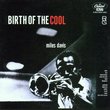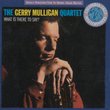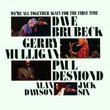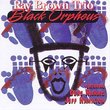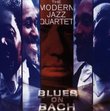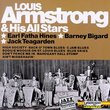| All Artists: Gerry Mulligan, Paul Desmond Title: Quartet Members Wishing: 0 Total Copies: 0 Label: Polygram Records Original Release Date: 1/1/1957 Re-Release Date: 11/16/1993 Genres: Jazz, Pop Style: Cool Jazz Number of Discs: 1 SwapaCD Credits: 1 UPC: 731451985027 |
Search - Gerry Mulligan, Paul Desmond :: Quartet
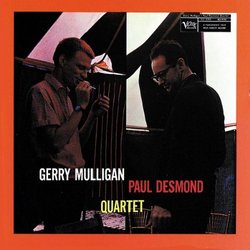 | Gerry Mulligan, Paul Desmond Quartet Genres: Jazz, Pop
|
Larger Image |
CD DetailsSimilar CDs
Similarly Requested CDs
|
CD ReviewsToo marvelous for words B. J Robbins | La Quinta, CA United States | 04/15/2004 (5 out of 5 stars) "This A.M. session with Mulligan and Desmond is just too good for words. Each of them plays perfectly, whether soloing, or playing in unison, written or improvised. It's simply two of jazz's greatest saxophone players having a ball playing with each other. We are truly fortunate to have the results of the session to savour over and over. Every tune is a winner, but my personal favorite is "Body and Soul", that although played at a deathly slow tempo, is not for a second boring or trite. Desmond plays quite differently than he did with Brubeck here. The wispy lyricism is replaced with some really gutsy, bluesy playing.This album is a gem and remains one of my favorites after some 40 years. The playing never gets stale or ages. Do yourself a favor and buy this CD. If you are a true jazz fan, you won't be sorry!" Still stunning, 50 years on... Larry L. Looney | Austin, Texas USA | 04/14/2007 (5 out of 5 stars) "This recording - originally issued as BLUES IN TIME - is one for the ages. It's amazing to think, while listening to this album, that it was recorded almost 50 years ago, in August 1957. It just illustrates that great music is timeless - it's as fresh and relevant today as when it was new. I would have been 7 or 8 years old when the LP was originally released - sadly, I hadn't yet discovered the wonders of jazz...if I had heard this at the time, my head would probably have exploded. The 50s were a particularly exciting time for jazz - the mid-to-late 40s had produced some of the greatest players of all time, experimentation was embraced, and styles were shooting off in all directions, much to the benefit of both the musicians and listeners. Gerry Mulligan, who would prove his staying power over the years, remaining vital to the end of his days, had been largely responsible for the mind-blowing arrangements and overall sound on Miles Davis' landmark BIRTH OF THE COOL sessions (recorded in the late 40s, released on LP in 1957) - Paul Desmond had established his reputation as well, and was a highly respected member of the Dave Brubeck Quartet. The Brubeck group's recording of Desmond's composition `Take five' did as much as any other event to spread the popularity / acceptance of jazz beyond the smoky nightclubs where it was featured. Gerry Mulligan was known all his life as an irrepressible sit-in player - he would show up at gigs by other musicians, planned or impromptu, and play along. In standard arrangements or when improvising, his work was stellar. One such sit-in, at a 1954 Carnegie Hall appearance by the Dave Brubeck Quartet, was the first instance of Mulligan and Desmond sharing a stage - the two reedmen found an instant rapport, but had difficulty bringing any recording plans to fruition due to label contract conflicts. Through a series of trade-offs, GERRY MULLIGAN / PAUL DESMOND was recorded later that year and released by Fantasy Records. BLUES IN TIME in 1957 was followed by TWO OF A MIND (on Verve) in 1962, and WE'RE ALL TOGETHER AGAIN FOR THE FIRST TIME (on Atlantic) in 1972, which also included Dave Brubeck. Coming out of the age of Charlie Parker - and undoubtedly feeling Bird's great shadow, as did any sax player of that time - Desmond carved out his own niche with his alto, combining the energy of bebop with one of the keenest senses of melody and harmony in the field. He was where the freedom and energy of New York met the `cool' of the California jazz scene - he combined these two (and other elements) effortlessly and seamlessly, with a quiet humility, always showing the greatest admiration and respect for fellow players. There's a great story about someone musing aloud to Desmond whether Brubeck would have `made it' without him - Desmond quickly and gently replied, `I never would have made it without Dave. He's amazing harmonically, and he can be a fantastic accompanist. You can play the wrongest [sic] note possible in any chord, and he can make it sound like the only right one.' BLUES IN TIME is a dream of a session. There are originals by both Mulligan and Desmond, along with some standards of the day - `Body and soul'; a great quasi-bebop rendition of `Tea for two' that you might not recognize without reading the title; and the Rodgers / Hart classic `Lover'. It's hard to pick standouts here - but I would have to give a nod to Desmond's `Blues in time' and `Wintersong', as well as Mulligan's great `Line for Lyons' (did he ever record a bad version of this tune...?) and `Stand still'. Mulligan's rich baritone and Desmond's lyrical alto dart and weave in and out of each other's lines, finding harmonies, laying down supporting riffs, and sometimes just laying out - I can just picture one or the other simply stepping back to dig what the other is playing. There's not a single line where one gets in the way of the other - the whole album is a joy, from beginning to end, with the two leaders being supported very ably by Joe Benjamin on bass and Dave Bailey on drums. This is one of those classics that no jazz enthusiast should be without - and, truthfully, something that should be in the collection of anyone who enjoys jazz...or any great music...at all. The currently available version seems to have been re-mastered with reasonable care, and only lists for $[...]. What are you waiting for...? " Desmond's creative period Eric Shoenfeld | Baldwin, NY USA | 11/09/2006 (5 out of 5 stars) "Paul Desmond is well known and broadly admired for his bell-like sound (tone), but this set of recordings well demonstrates the inventive quality of his earlier sesions. His interaction with Mulligan in this piano-free quartet environment brings out the chromatics that might be missed in the Brubeck era recordings. Among his really best."
|

 Track Listings (11) - Disc #1
Track Listings (11) - Disc #1